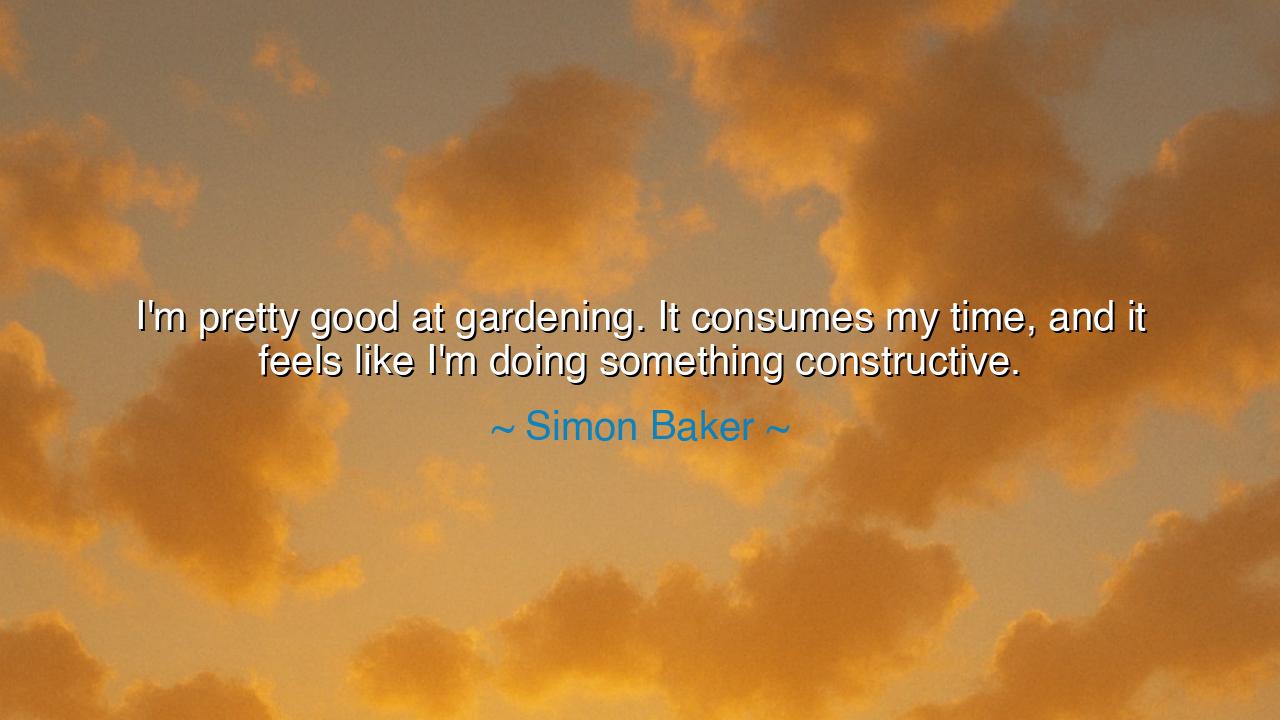
I'm pretty good at gardening. It consumes my time, and it feels
I'm pretty good at gardening. It consumes my time, and it feels like I'm doing something constructive.






The words “I’m pretty good at gardening. It consumes my time, and it feels like I’m doing something constructive” were spoken by Simon Baker, the Australian actor best known for his thoughtful demeanor and quiet grace. Yet in this unassuming statement lies a profound truth about the human spirit — the need to create, to nurture, and to find purpose in labor that restores rather than depletes. In a world filled with noise, haste, and hollow achievement, Baker’s reflection calls us back to the ancient rhythm of constructive living, where creation itself is the reward and the work of the hands becomes the peace of the soul.
When he says that gardening “consumes my time,” he does not mean it as a lament, but as an offering. Time, our most precious possession, becomes sacred when given to something that grows. The garden asks for patience, attention, and continuity — virtues that modern life often neglects. It is a place where hours dissolve not in waste, but in wonder. To lose oneself in the garden is not to vanish, but to return — to a simpler, truer way of being. Baker, in tending his plants, participates in the ancient covenant between man and earth, the same one that sustained the first farmers, monks, and poets who knew that tending the soil was also tending the self.
His phrase “it feels like I’m doing something constructive” reveals the essence of meaningful work. The modern world often confuses activity with accomplishment — endless motion that leaves the soul empty. But true construction, whether in the soil, in art, or in character, is that which leaves something living behind. To plant a seed is to build something lasting, even if it is fragile. It is an act of faith — faith that care leads to creation, that patience yields beauty. Baker’s words remind us that creation is the antidote to despair. To do something constructive, no matter how small, is to push back against the chaos of meaninglessness.
This wisdom is as old as civilization. The great Roman philosopher Cicero once wrote, “If you have a garden and a library, you have everything you need.” Cicero knew, as Simon Baker does, that gardening is not a hobby but a philosophy — a balance between action and reflection, labor and contemplation. Even the emperor Marcus Aurelius, burdened with the cares of empire, found solace in the natural order of things, writing that “what the earth bears in season” teaches mankind acceptance. The gardener learns, as they did, that time spent in quiet creation is never wasted — it is the training ground of patience, humility, and peace.
To say one is “good at gardening” is also an act of humility. It acknowledges that mastery in the garden is not about control, but cooperation with nature’s will. The good gardener does not dominate the earth; he listens to it. He learns the secret timings of the seasons, the quiet warnings of the weather, the mysterious dialogue between root and rain. Every success and every failure teaches him something new about resilience. In this way, the gardener’s growth mirrors the garden’s growth — both are cultivated slowly, gently, persistently. Baker’s pride is not in perfection, but in participation: he feels alive because he contributes to the living world.
There is, too, something healing in his words — the idea that creation restores order to the heart. Many who have endured weariness, grief, or uncertainty have found comfort in the constructive rhythm of gardening. During the long dark years of war, Vera Brittain, the British writer and nurse, found solace in her small plot of flowers, saying that “planting life is the only answer to death.” Even in the ruins of civilization, people turned to gardens — proof that life insists on renewal. Baker’s statement, though calm and personal, carries that same heroic undercurrent: that to create, however modestly, is to affirm life itself.
The lesson in Simon Baker’s reflection is clear: fulfillment is not found in grandeur, but in groundedness. To create, to tend, to build — these are the acts that nourish






AAdministratorAdministrator
Welcome, honored guests. Please leave a comment, we will respond soon